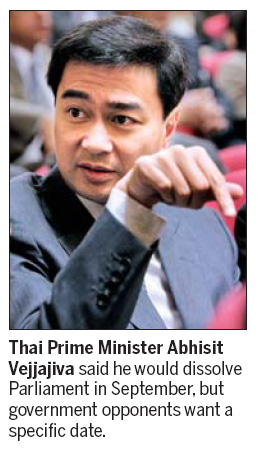|
Anti-government protesters look toward the sky as helicopters fly overhead during a rally at their encampment on Thursday in Bangkok, Thailand. Wong Maye-E / Associated Press |

|
Anti-government protesters look toward the sky as helicopters fly overhead during a rally at their encampment on Thursday in Bangkok, Thailand. Wong Maye-E / Associated Press |

Abhisit offers to dissolve Parliament early but election date in dispute
BANGKOK - Thailand's prime minister said on Thursday he would dissolve Parliament in September, paving the way for new elections demanded by anti-government protesters if they end their crippling occupation of Bangkok's commercial district.
But in a sign of the deep mistrust between the opposing sides, the demonstrators said they would not go home until the government made its promise official and specified a date for the legislature's dissolution.
On Monday, Prime Minister Abhisit Vejjajiva unveiled a roadmap to reconciliation that included an offer of new elections on Nov. 14 - about a year before his term would end - if they pulled out of their barricaded encampment in the heart of the Thai capital.
Leaders of the anti-government movement, known as the "red shirts", welcomed that plan, which takes into account the protesters' main grievances. It includes respect for the monarchy, reforms to resolve economic injustice, free but responsible media to be overseen by an independent watchdog agency, independent investigations of violent incidents connected with the protests, and amendment of the constitution to be more fair to all political parties.
But thousands remained barricaded in a 3 sq km (1.2 sq mile) stretch of upscale department stores, luxury hotels and expensive apartments in central Bangkok, escaping the tropical rain under makeshift tents.
"We still have problems with many issues," Nattawut Saikua, a protest leader, told reporters. They had yet to agree to Abhisit's offer of a Nov. 14 election, he added.
The"red shirts", who draw most of their supporters from Thailand's rural and urban poor, view Abhisit's government as a symbol of an elite impervious to their plight. They say he rose to power illegitimately through back-room deals and military pressure on legislators.
The nearly two-month standoff in Bangkok has paralyzed vital areas of the capital, hammered the economy, decimated the tourist industry and ground government machinery to a near halt. Clashes with soldiers and other violence have killed 27 people and injured nearly 1,000.
On Wednesday night, about 10,000 demonstrators packed a premier shopping district, which has been the center of their encampment, said army spokesman Col. Sansern Kaewkamnerd. He said the crowd size has been on a "downward trend" after highs last month of several tens of thousands.
Abhisit is insisting on a total pullout.
"If they don't go home, I'm not going to dissolve Parliament," Abhisit said on ASTV. Other Thai media quoted Abhisit as saying the dissolution could take place Sept. 15 to 30.
"I repeat, I am not negotiating with anybody," Abhisit said in the interview, but added he was "inviting everyone into a reconciliation process, "including the protesters."
Meanwhile, "red shirts" protest leaders demanded the opposite scenario.
"It's impossible for protesters to disperse before the government announces the Parliament dissolution," said Nattawut Saikua, a protest leader. "A mutual agreement needs to be reached first."
The timing of the dissolution has been a crucial issue because a key reshuffle of top military posts is scheduled for September. It's not clear if a caretaker government, which would run the country after Parliament is dissolved, would be allowed to make the appointments.
Protest leaders say Abhisit's proposal is too vague and they need clarity.
On Wednesday, Thais put aside their political animosity to honor the country's ailing monarch on the 60th anniversary of his coronation, and his rare public appearance inspired thousands lining the streets to chant "Long Live the King!"
The highly revered King Bhumibol Adulyadej emerged in a wheelchair from a Bangkok hospital to preside over the ceremonies. The 82-year-old king, the world's longest reigning monarch, has been hospitalized for the past nine months with what the palace initially described as a lung inflammation.
Associated Press
(China Daily 05/07/2010 page12)